 W
WBlade Runner is a 1982 science fiction film directed by Ridley Scott, and adapted by Hampton Fancher and David Peoples. Starring Harrison Ford, Rutger Hauer, Sean Young, and Edward James Olmos, it is an adaptation of Philip K. Dick's 1968 novel Do Androids Dream of Electric Sheep? The film is set in a dystopian future Los Angeles of 2019, in which synthetic humans known as replicants are bio-engineered by the powerful Tyrell Corporation to work on space colonies. When a fugitive group of advanced replicants led by Roy Batty (Hauer) escapes back to Earth, burnt-out cop Rick Deckard (Ford) reluctantly agrees to hunt them down.
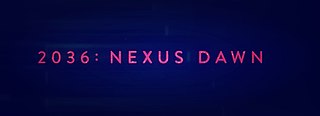 W
W2036: Nexus Dawn is a 2017 American neo-noir science fiction short film acting as a prequel to the feature film Blade Runner 2049. It is one of three such prequels, alongside Blade Runner Black Out 2022 and 2048: Nowhere to Run. The short was released on August 30, 2017, approximately five weeks before the release of the feature film, and features Jared Leto as Blade Runner 2049 character Niander Wallace, alongside Benedict Wong. The film was written by Hampton Fancher and Michael Green, who also wrote the feature film, and directed by Luke Scott, whose father Ridley Scott directed the original Blade Runner and is executive producer on the sequel Blade Runner 2049.
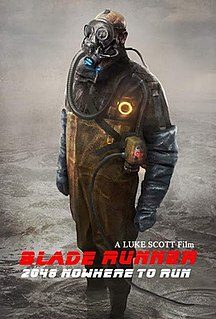 W
W2048: Nowhere to Run is a 2017 American neo-noir science fiction short film acting as a prequel to the feature film Blade Runner 2049 and the sequel to the short film 2036: Nexus Dawn. It is one of three such prequels, alongside Blade Runner Black Out 2022 and 2036: Nexus Dawn. The short was released on September 16, 2017, approximately three weeks before the release of the feature film, and features Dave Bautista as Blade Runner 2049 character Sapper Morton, alongside Orion Ben. The film was written by Hampton Fancher and Michael Green, who also wrote the feature film, and directed by Luke Scott, whose father Ridley Scott directed the original Blade Runner and is executive producer on the sequel Blade Runner 2049.
 W
WBlade Runner 2049 is a 2017 American neo-noir science fiction film directed by Denis Villeneuve and written by Hampton Fancher and Michael Green. A sequel to the 1982 film Blade Runner, the film stars Ryan Gosling and Harrison Ford, with Ana de Armas, Sylvia Hoeks, Robin Wright, Mackenzie Davis, Carla Juri, Lennie James, Dave Bautista, and Jared Leto in supporting roles. Ford and Edward James Olmos reprise their roles from the original film. Set thirty years after the first film, Gosling plays K, a blade runner who uncovers a secret that threatens to instigate a war between humans and replicants. The film was released on October 6, 2017 in the United States and has grossed $259 million worldwide.
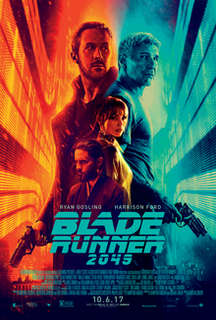 W
WBlade Runner 2049 is a 2017 American neo-noir science fiction film directed by Denis Villeneuve and written by Hampton Fancher and Michael Green. A sequel to the 1982 film Blade Runner, the film stars Ryan Gosling and Harrison Ford, with Ana de Armas, Sylvia Hoeks, Robin Wright, Mackenzie Davis, Carla Juri, Lennie James, Dave Bautista, and Jared Leto in supporting roles. Ford and Edward James Olmos reprise their roles from the original film. Gosling plays K, a Nexus-9 replicant "blade runner" who uncovers a secret that threatens to destabilize society and the course of civilization.
 W
WBlade Runner is a video game loosely inspired by the 1982 film Blade Runner, but is technically based on the film soundtrack by Vangelis as the publishers were unable to obtain a licence for a film tie-in. The game was published in 1985 by CRL Group PLC for Commodore 64, ZX Spectrum and Amstrad CPC. Reviews of the game were mostly negative.
 W
WBlade Runner is a 1997 point-and-click adventure game developed by Westwood Studios and published by Virgin Interactive for Microsoft Windows. The game is not a direct adaptation of the 1982 Ridley Scott film Blade Runner, but is instead a "sidequel", telling an original story, which runs parallel to the film's plot, occasionally intersecting with it.
 W
WBlade Runner is a science fiction novella by Beat Generation author William S. Burroughs, first published in 1979.
 W
WBlade Runner is a 1982 science fiction film directed by Ridley Scott, and adapted by Hampton Fancher and David Peoples. Starring Harrison Ford, Rutger Hauer, Sean Young, and Edward James Olmos, it is an adaptation of Philip K. Dick's 1968 novel Do Androids Dream of Electric Sheep? The film is set in a dystopian future Los Angeles of 2019, in which synthetic humans known as replicants are bio-engineered by the powerful Tyrell Corporation to work on space colonies. When a fugitive group of advanced replicants led by Roy Batty (Hauer) escapes back to Earth, burnt-out cop Rick Deckard (Ford) reluctantly agrees to hunt them down.
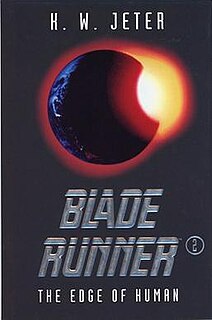 W
WBlade Runner 2: The Edge of Human (1995) is a science fiction novel by American writer K. W. Jeter. It is a continuation of both the film Blade Runner and the novel upon which the film was based, Philip K. Dick's Do Androids Dream of Electric Sheep?
 W
WBlade Runner 3: Replicant Night is a science fiction novel by American writer K. W. Jeter published in 1996. It is a continuation of Jeter's novel Blade Runner 2: The Edge of Human, which was itself a sequel to both the film Blade Runner and the novel upon which the film was based, Philip K. Dick's Do Androids Dream of Electric Sheep?
 W
WBlade Runner 4: Eye and Talon is a science fiction novel by American writer K. W. Jeter, published in 2000 by Gollancz. It is the third book to continue the storyline of the film Blade Runner.
 W
WBlade Runner Black Out 2022 is a tech-noir cyberpunk anime short film directed by Shinichiro Watanabe and animated by Cygames Pictures. The short is one of three short films, alongside 2036: Nexus Dawn and 2048: Nowhere to Run, that serve as prequels to the live-action film Blade Runner 2049. It debuted on 27 September 2017 on Crunchyroll.
 W
WBlade Runner 2: The Edge of Human (1995) is a science fiction novel by American writer K. W. Jeter. It is a continuation of both the film Blade Runner and the novel upon which the film was based, Philip K. Dick's Do Androids Dream of Electric Sheep?
 W
WBlade Runner: Black Lotus is a Japanese–American anime television series based on the Blade Runner franchise that premiered on November 14, 2021. It is a co-production between Crunchyroll and Adult Swim, in addition to being created in partnership with Alcon Television Group.
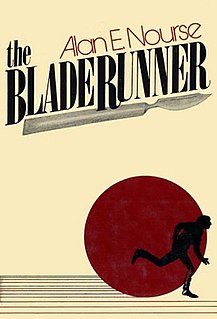 W
WThe novel The Bladerunner is a 1974 science fiction novel by Alan E. Nourse, about underground medical services and smuggling. It was the source for the name, but no major plot elements, of the 1982 film Blade Runner, adapted from the novel Do Androids Dream of Electric Sheep? by Philip K. Dick, though elements of the Nourse novel recur in a pair of 2002 films also largely adapted from Dick's work, Impostor and Minority Report.
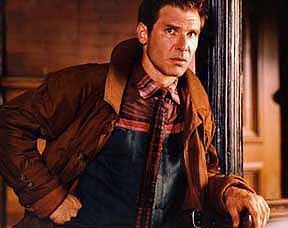 W
WRick Deckard is a fictional character, the protagonist of Philip K. Dick's 1968 novel Do Androids Dream of Electric Sheep?. Harrison Ford portrayed the character in the 1982 film adaptation, Blade Runner, and reprised his role in the 2017 sequel, Blade Runner 2049. James Purefoy voiced the character in the 2014 BBC Radio 4 adaptation.
 W
WDo Androids Dream of Electric Sheep? is a dystopian science fiction novel by American writer Philip K. Dick, first published in 1968. The novel is set in a post-apocalyptic San Francisco, where Earth's life has been greatly damaged by a nuclear global war, leaving most animal species endangered or extinct. The main plot follows Rick Deckard, a bounty hunter who is tasked with "retiring" six escaped Nexus-6 model androids, while a secondary plot follows John Isidore, a man of sub-par IQ who aids the fugitive androids.
 W
WDo Androids Dream of Electric Sheep? is a dystopian science fiction novel by American writer Philip K. Dick, first published in 1968. The novel is set in a post-apocalyptic San Francisco, where Earth's life has been greatly damaged by a nuclear global war, leaving most animal species endangered or extinct. The main plot follows Rick Deckard, a bounty hunter who is tasked with "retiring" six escaped Nexus-6 model androids, while a secondary plot follows John Isidore, a man of sub-par IQ who aids the fugitive androids.
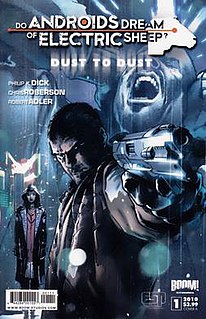 W
WDust to Dust or Do Androids Dream of Electric Sheep?: Dust to Dust is an 8 issue comic book limited series published by BOOM! Studios in 2010. The series is a prequel to the story of Do Androids Dream of Electric Sheep? The series was written by Chris Roberson and drawn by Robert Adler.
 W
WMarvel Comics Super Special: Blade Runner or just Blade Runner is a comic book adaptation of the film Blade Runner, published by Marvel Comics in 1982. It was written by Archie Goodwin with art by Al Williamson, Carlos Garzon with Dan Green and Ralph Reese.
 W
WSydney Jay Mead was an American industrial designer and neo-futurist concept artist, widely known for his designs for science-fiction films such as Blade Runner, Aliens and Tron. Mead has been described as "the artist who illustrates the future" and "one of the most influential concept artists and industrial designers of our time."
 W
WThe following is a list of unproduced Ridley Scott projects in roughly chronological order. During his long career, English film director and producer Ridley Scott has worked on a number of projects that never progressed beyond the pre-production stage under his direction. Some of these projects fell into development hell or are officially canceled.
 W
WThe following is a list of unproduced Ridley Scott projects in roughly chronological order. During his long career, English film director and producer Ridley Scott has worked on a number of projects that never progressed beyond the pre-production stage under his direction. Some of these projects fell into development hell or are officially canceled.
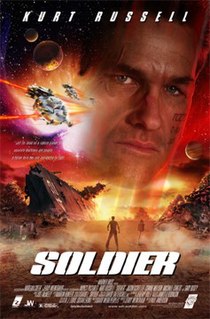 W
WSoldier is a 1998 American science fiction action film directed by Paul W. S. Anderson, written by David Webb Peoples, and starring Kurt Russell, Jason Scott Lee, Jason Isaacs, Connie Nielsen, Sean Pertwee and Gary Busey. The film tells the story of a highly skilled and emotionally distant soldier who is left for dead, befriends a group of refugees, then faces his former superiors who are determined to eliminate them.
 W
WBlade Runner: Original Motion Picture Soundtrack is the soundtrack for Ridley Scott's 1982 science-fiction noir film Blade Runner, composed by Greek electronic musician Vangelis. It has received acclaim as among Vangelis's best work and an influential work in the history of electronic music. It was nominated in 1983 for a BAFTA and Golden Globe as best original score. The score evokes the film's bleak futurism with an emotive synthesizer-based sound, drawing on the jazz scores of classic film noir as well as neo-classical elements and Middle Eastern texture. It features vocals from Demis Roussos and saxophone by Dick Morrissey on "Love Theme". The track "Memories of Green" from Vangelis' 1980 album See You Later was also used.
 W
WBlade Runner 2049 – Original Motion Picture Soundtrack is the soundtrack album for the 2017 film Blade Runner 2049. Released in October 2017, the album contains music composed by Hans Zimmer and Benjamin Wallfisch, along with additional tracks by Elvis Presley, Frank Sinatra and Lauren Daigle. The soundtrack was produced by Michael Hodges, Kayla Morrison and Ashley Culp. It also includes the piece "Tears in the Rain", which was originally composed and performed by Vangelis, the composer of the original 1982 soundtrack Blade Runner.
 W
W"Tears in rain" is a 42-word monologue, consisting of the last words of character Roy Batty in the 1982 Ridley Scott-directed film Blade Runner. Written by David Peoples and altered by Hauer, the monologue is frequently quoted. Critic Mark Rowlands described it as "perhaps the most moving death soliloquy in cinematic history", and it is commonly viewed as the defining moment of Hauer's acting career.
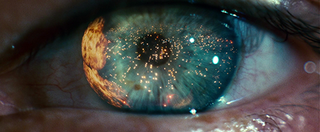 W
WDespite the initial appearance of an action film, Blade Runner operates on an unusually rich number of dramatic levels. As with much of the cyberpunk genre, it owes a large debt to film noir, containing and exploring such conventions as the femme fatale, a Chandleresque first-person narration in the Theatrical Version, the questionable moral outlook of the hero—extended here to include even the literal humanity of the hero, as well as the usual dark and shadowy cinematography.
 W
WSeven different versions of Ridley Scott's 1982 science fiction film Blade Runner have been shown, either to test audiences or theatrically. The best known versions are the Workprint, the US Theatrical Cut, the International Cut, the Director's Cut and the Final Cut. These five versions are included in both the 2007 five-disc Ultimate Collectors Edition and 2012 30th-Anniversary Collector's Edition releases.
 W
W W
W W
W W
W W
W W
W W
W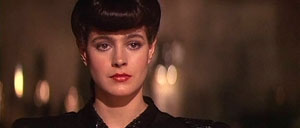 W
W W
W W
W W
W W
W W
W W
W W
W W
W W
W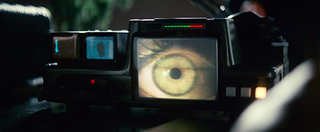 W
W